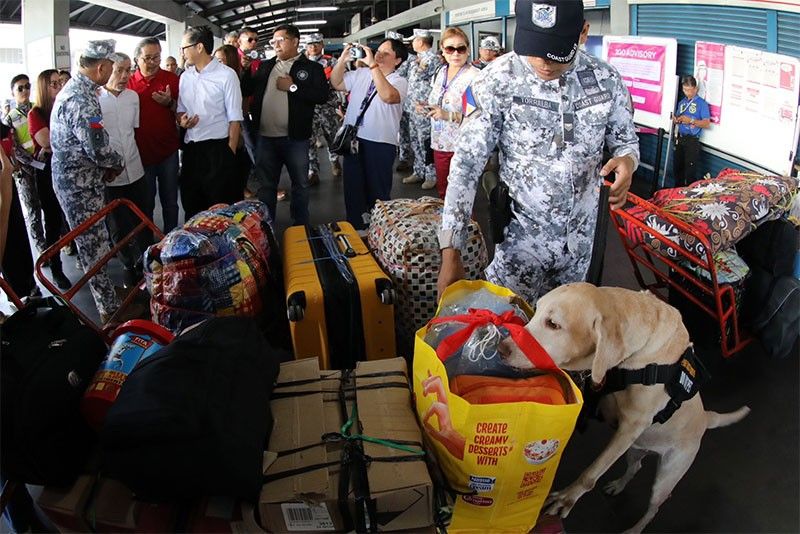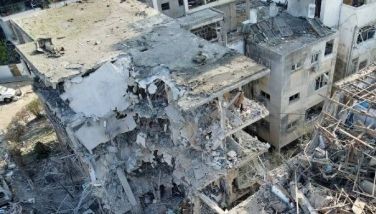Security tightened for Holy Week

MANILA, Philippines — The Philippine National Police as well as other government agencies are all hands on deck this Holy Week, with over 40,000 PNP personnel deployed nationwide to ensure public safety.
PNP spokesperson Brig. Gen. Jean Fajardo said yesterday that 40,283 police personnel have been assigned to key locations, including transport terminals, major thoroughfares, tourist spots and churches.
This follows President Marcos’ directive to ensure the safety of Filipinos, whether they are traveling or staying at home this week, Malacañang said.
“Our President’s directive is to give our citizens – and not only Filipinos but those who are visiting our country – safe and convenient travel,” Presidential Communications Undersecretary Claire Castro said at a press briefing yesterday.
The PNP is currently on heightened alert until the conclusion of the election period in June. Under this status, 75 percent of the police force is on duty, and a “no leave” policy has been implemented, except during emergencies.
Of the more than 40,000 cops, over 10,000 are deployed in the National Capital Region.
“We have deployed police to the streets… because we all know that this is an election season… our police visibility efforts are enhanced to ensure that the residents of Metro Manila and visitors feel safe and secure,” National Capital Region Police Office (NCRPO) director Maj. Gen. Anthony Aberin told Teleradyo Serbisyo yesterday.
Aberin assured the public that there is no serious security threat looming over Metro Manila, but the NCRPO’s intelligence unit is in coordination with the Armed Forces of the Philippines for continued monitoring.
Meanwhile, the PNP-Highway Patrol Group (HPG) dispatched 840 personnel to critical areas to manage traffic flow, assist motorists and secure major roads.
These include 117 personnel in commercial zones, 226 in transportation hubs, 61 near places of worship, 105 in other public convergence points and 252 along key highways.
“Our mission this Holy Week is clear: to provide maximum police visibility and immediate assistance to ensure a peaceful and safe observance for all,” HPG director Brig. Gen. Eleazar Matta said.
Special attention has been placed on the Marilaque Highway, where 11 traffic incidents were recorded this year.
“We aim for zero incidents this April,” noted HPG spokesperson Lt. Dame Malang.
In Central Luzon, at least 1,000 cops were deployed from April 13 to 20, according to Fajardo, who also heads Police Regional Office 3.
“Each year, we observe a surge of travelers in transport terminals and an influx of pilgrims and devotees in churches and pilgrimage sites, especially during Maundy Thursday and Good Friday,” she said.
Meanwhile, PNP chief Gen. Rommel Marbil warned personnel against possible electioneering during Holy Week, as many people are expected to return to their hometowns.
“Do not allow yourselves to be used by politicians. Remain apolitical. We serve the Filipino people, not political interests,” he said during a command conference at Camp Crame yesterday.
Passenger surge
The Department of Transportation on Sunday said it expects around 150,000 passengers to troop to terminals of the Ninoy Aquino International Airport (NAIA) every day throughout the Holy Week.
Yesterday, Transportation Secretary Vince Dizon inspected different transport facilities to address possible issues such as overloading.
On Saturday, all three NAIA terminals recorded combined foot traffic of 154,000 passengers, although numbers decreased on Sunday and Monday as many were still at work, Manila International Airport Authority general manager Eric Ines told radio dzBB.
Ines said long queues at the immigration counters pose a challenge, but NAIA Terminal 3 opened six additional counters last week for the exclusive use of overseas Filipino workers (OFWs).
“If the OFW lanes are relatively clear, other regular passengers can be transferred there,” Ines said.
For NAIA alone, the Bureau of Immigration “fielded a total of 48 immigration frontliners” to handle the surge of passengers during peak arrival and departure hours, BI Commissioner Joel Anthony Viado said in a statement.
The Civil Aviation Authority of the Philippines said all of its 44 operated airports are on heightened alert and that major airports will continue operating 24/7, with enhanced coordination between CAAP and airline partners to ensure the smooth management of flight operations.
Security and baggage screening procedures have been intensified, while passengers were reminded of the following: verify flight details including terminal assignments and airline advisories before heading to the airport; arrive at the airport early, or at least three hours before flights, to allow ample time for check-in and security screening; follow airline baggage regulations and avoid bringing prohibited items; pack power banks in hand-carry bags only, ensuring they meet airline-approved capacity limits; refrain from bringing sharp objects, flammable items and oversized liquids in carry-on luggage; never leave baggage unattended and avoid making jokes or comments about bombs or threats, which are considered criminal offenses.
The Department of Tourism earlier said 30 million local and foreign tourists are expected to visit the country’s most popular tourist attractions this Holy Week.
In a statement, the DOT said Cebu, Bohol, Boracay, Palawan, Siargao, Baguio, Batangas, Ilocos Norte and Sur, Pampanga, Pangasinan and Puerto Galera may be this year’s top destinations.
Meanwhile, Sen. Grace Poe has called for improved passenger comfort at the NAIA terminals amid the intensifying heat and the Holy Week rush.
“Passenger comfort is not rocket science… clean restrooms, functioning air-conditioned units and reliable power and water supply are not luxuries but basic requirements,” she said.
Health workers protest
Mimicking the carrying of the cross during Lent, members of the Alliance of Health Workers (AHW) protested in front of the Department of Health central office in Manila yesterday, one of whom had a large wooden cross on his shoulder signifying their hardships and sacrifices.
“The Marcos administration promised to uplift the conditions of health workers and the Filipino people, but such promise remains empty as we continue to struggle with low wages, unpaid and delayed benefits, chronic understaffing, no job security and the ongoing privatization of health services,” AHW national officer Edwin Pacheco said.
The group emphasized the need for the nationwide implementation of a family living wage, currently set at P1,200 per day and P33,000 per month, as the entry-level salary for all health workers, both in public and private sectors, as well as government employees. — EJ Macababbad, Ric Sapnu, Rudy Santos, Evelyn Macairan, Cecille Suerte Felipe, Rhodina Villanueva
- Latest
- Trending






























